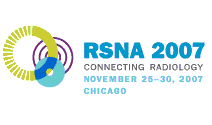
Abstract Archives of the RSNA, 2007
SSJ05-06
The Impact of Fetal MRI Findings on Genetic Counseling and Management Decision in High Risk Pregnancies for Brain Malformations
Scientific Papers
Presented on November 27, 2007
Presented as part of SSJ05: Genitourinary (Fetal MR Imaging)
Sahar Saleem MD, Presenter: Nothing to Disclose
Maha S. Zaki MD, Abstract Co-Author: Nothing to Disclose
To assess the impact of correlating fetal MRI findings with genetic workup on management decision-making of high risk pregnancies for brain malformations.
Between year 2003 and 2006, we prospectively performed comprehensive ultrafast MRI for 80 fetuses with history of previous pregnancies with brain malformations and/or possible brain anomalies detected by US. Fifty five fetuses were less than 24 weeks of gestation. For each fetus, we correlated MRI findings with clinical data, a recent sonogram and genetic workup to reach a management decision. Definitive diagnoses were reached by clinical postnatal follow up in a period of 24 ±12.1 months, postnatal MRI or autopsy. Retrospectively, we compared prenatal MRI findings with postnatal diagnoses and analyzed the impact of fetal MRI on genetic counseling and pregnancy management decision.
Fetal MRI detected abnormalities that were confined to the brain in 10 fetuses and complex anomalies that involved the fetal brain and body in 8 cases. In each case, fetal MRI determined the extent of the disorder, enabled a differential diagnosis, and provided insight into the cause and recurrence risks. In correlation with genetic workup, MRI enabled accurate diagnoses and gave reasonable expectations regarding the dismal outcome of 16 pregnancies with complex or severe brain malformations. In 2 cases with milder brain malformations, fetal MRI recommended continuation of pregnancy and follow up. Fetal MRI increased the confidence in continuation of 62 pregnancies with normal MR findings, 60 of them showed normal postnatal outcome. Fetal MRI was particularly valuable in screening for abnormalities of cerebral cortical development, posterior fossa, and corpus callosum.
By improving brain anatomic definition, clarifying the diagnosis of brain anomalies and identifying associated abnormalities, fetal MRI enabled accurate prognosis and genetic counseling of suspected fetal brain malformations.
Correlating fetal MRI findings with clinical data and genetic workup is critical to ensure optimum management of a suspected fetal brain malformation.
Saleem, S,
Zaki, M,
The Impact of Fetal MRI Findings on Genetic Counseling and Management Decision in High Risk Pregnancies for Brain Malformations. Radiological Society of North America 2007 Scientific Assembly and Annual Meeting, November 25 - November 30, 2007 ,Chicago IL.
http://archive.rsna.org/2007/5000891.html

